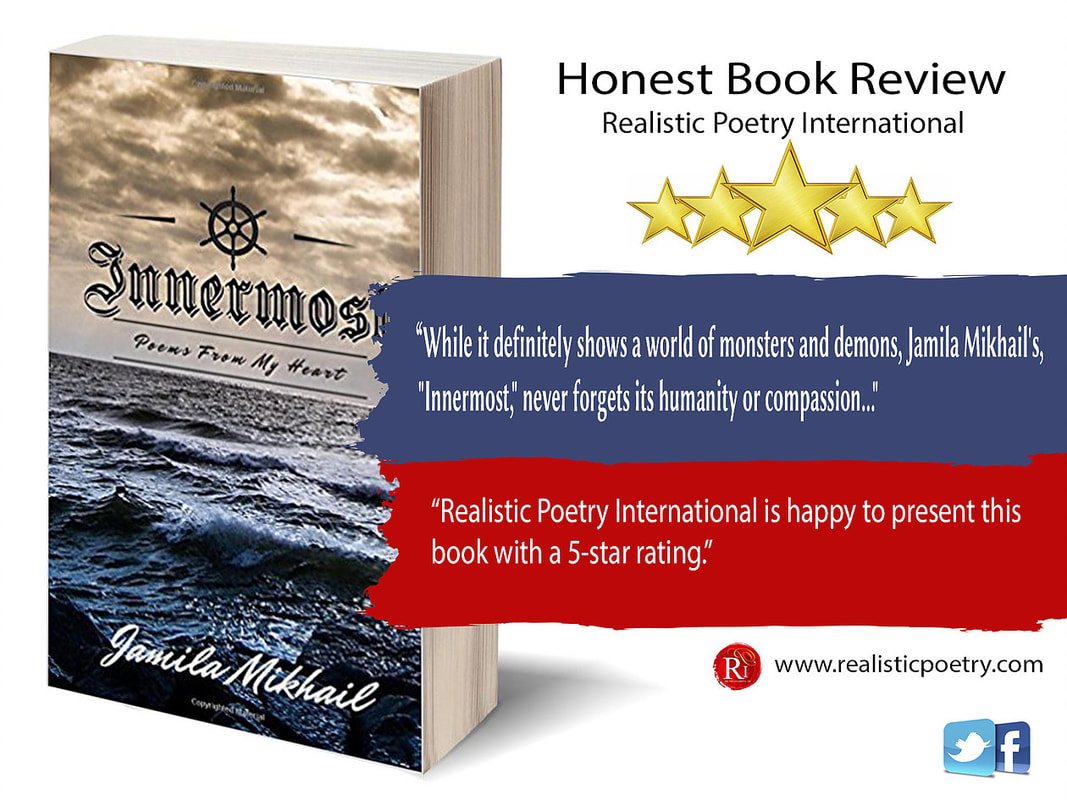I'm proud to present you with my second book review from the team at Realistic Poetry International for my poetry book "Innermost" that is available in paperback, ebook and audiobook formats. Click here to read the original post on Realistic Poetry's website or read the copied text below! Don't forget to leave a comment as well!
If there’s only two things I understand at a visceral level, those would be trauma and poetry. Innermost by Jamila Mikhail encapsulates both with an astounding breadth, depth, and respect, displaying both the cause and effects of PTSD while somehow managing not to instantly set off my own post-traumatic triggers even once. As a warning, if you do have PTSD, there’s an excellent chance that you will see at least one of your triggers in this book, and I strongly encourage any such reader to treat the foreword as a content warning for the entire volume. Even so, I give this a 5-star rating, without any doubt or hesitation.
With each poem I read, I found fragments of myself throughout. Even the first, “A Man Called Joachim”, reminded me of a man I had loved and lost, yet never had to begin with. “Broken Glass” brought me back to my childhood, even though I’m fairly sure it was about domestic abuse, but that sort of behavior transcends a single scenario. “Black Soul” perfectly records the self-delusions of depression and self-loathing, the relentless belief of one’s own worthlessness, even that one is an innate threat to others. It quietly captures the occasional death wish, the urge to suffer, the need to make the pain stop, regardless of how. Each poem is yet another window into the very nature of human suffering and the manifold ways in which it comes to linger as trauma and post-traumatic stress.
While it definitely shows a world of monsters and demons, Innermost never forgets its humanity or compassion, and I’d consider it a must-read for anyone trying to better understand their own past traumas. Even if you don’t find answers, you’ll know you aren’t alone, that others have been where you are, and that death is not the only way out.
With each poem I read, I found fragments of myself throughout. Even the first, “A Man Called Joachim”, reminded me of a man I had loved and lost, yet never had to begin with. “Broken Glass” brought me back to my childhood, even though I’m fairly sure it was about domestic abuse, but that sort of behavior transcends a single scenario. “Black Soul” perfectly records the self-delusions of depression and self-loathing, the relentless belief of one’s own worthlessness, even that one is an innate threat to others. It quietly captures the occasional death wish, the urge to suffer, the need to make the pain stop, regardless of how. Each poem is yet another window into the very nature of human suffering and the manifold ways in which it comes to linger as trauma and post-traumatic stress.
While it definitely shows a world of monsters and demons, Innermost never forgets its humanity or compassion, and I’d consider it a must-read for anyone trying to better understand their own past traumas. Even if you don’t find answers, you’ll know you aren’t alone, that others have been where you are, and that death is not the only way out.

 RSS Feed
RSS Feed